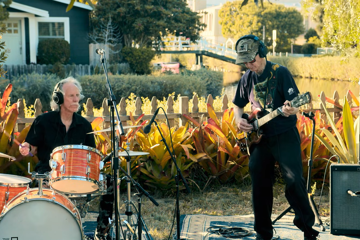CREED II
★★
In films about proud men with waxed chests punching each other in the head, there’s a fine line between greatness and also-ran status. That’s shown all too vividly by Creed II; a sequel to Ryan Coogler’s 2015 Michael B Jordan-starrer that’s so generic it makes you, in some kind of guilt-by-association, wonder whether the last one really was that good.
With Coogler — and his virtuoso steadicam tracking-shots — off in Wakanda, the job of inching the franchise along goes to 30-year-old Steven Caple Jr, who imprints no real directorial style or discernible personality, let alone virtuosity.
In the showstopping, grandstanding moments that define any Rocky movie — the training sequences — here Caple’s stuck recycling the misbegotten, kinda-dangerous tropes long peddled by the series: that the more high-tech your training is, the more fake and likely-to-lose you are, with the most down-to-Earth, nothing-fancy training a sure sign of the fighter who has the most “heart” and “guts” and other noxious macho clichés. Here, running along a sunbaked stretch of desert-highway until you collapse from exhaustion isn’t dabbling with death, just a sign of manly mettle. “It’s who wants it more! Who’s got more heart!” Rocky yells, at one point; which, like, go away already.
Given the last film gave us this glorious training montage, the cod-Mad-Max desert-dystopia workouts play as dire, depressing. The film itself feels just as dispiriting, the opposite to the unexpectedly-good joys of Creed. After Coogler and co-writer Aaron Covington brought an inspired approach to their franchise-reviver, here Sylvester Stallone is again writing things, his screenplay betraying a complete lack of inspiration. The Rocky revival of Creed turns into the shameless Rocky IV rehash of Creed II, the film far stupider in conception and execution.
Don't miss a beat with our FREE daily newsletter
Here, Son Of Creed battles Son Of Drago, 30-odd years and four films after “if he dies he dies”. Mid-bout, boxing commentator Max Kellerman yelps things like, “[Creed] knows better than anyone how this same story played out three decades ago!” and, “He’s listening to Rocky, who’s been in this situation before!” - just in case you hadn’t missed how shamelessly this film was pillaging from Rocky IV.
Kellerman somehow has as much dialogue in this thing as anyone else; but certainly is far-and-away the film-leader in speaking plot and theme aloud. “It all feels so Shakespearean!” he marvels, in another moment, in what’s a self-congratulatory stretch by Stallone and co-writer Juel Taylor. “Two sons, raised worlds apart, inexorably linked by tragedy!”
That the commentary spells things out so openly doubles down on the terminal case of shameless fan-service that afflicts the film. Here, in keeping with the Rocky IV revival, old Russki villains Dolph Lundgren and Brigitte Nielsen (Swedish and Danish, respectively, god bless ’80s casting) are wheeled out for nostalgia’s sake. In a bit of unintentionally-funny writing, Papa Drago’s life fell apart after he lost his climactic Rocky IV fight; a hitting-rock-bottom which duly involved his glamorous trophy-wife walking out on him, leaving him to raise a chip off the ol’ man-mountain-pugilist block on his bearded-and-beanie-wearing lonesome.
Three decades on, Lundgren’s still bitter, employing such resentment as trainer, leveraging his son’s abandonment-issues in a coaching approach that’s best described as negging. “That’s why she left us!” dad glowers, in a bit of inspirational between-rounds speech-giving, wondering why his son has yet to literally kill his opponent.
The screenplay tries to create empathy for both father (a discarded Soviet-era prop) and son (left only with a disapproving dad), but also lets them be generic villains, all monosyllabic threats of pain and destruction (which is a long way from Black Panther, a film which makes a great case that its villain is actually its hero). Creed II also wildly telegraphs who’s going to win each of its three bouts, even as Kellerman has to sell the laughable line that Creed is a “25-1 underdog” in the final climactic battle.
If there’s something to recommend Creed II for, it actually has nothing to do with the fighting, or the endless tedious evocations of fathers and sons and passed-down legacies. Tessa Thompson’s character sometimes feels more like device than real human — and clearly Stallone and Taylor have no idea about the realities of the modern music industry — but her musician-with-degenerative-hearing-condition story is taken to a profound place in Creed II, in a different exploration of things handed down from parents to children.
Wondering if the newborn Jordan/Thompson babe that arrives mid-film has been born hearing-impaired, the film stills for an auditory hearing exam; a moment with far more tension than any of its fights, and with currents of conflicting, unspoken emotion running between parents. It’s an unexpectedly-profound scene in a film that is, otherwise, absent any such profundity. Though it’s the most cinematically memorable moment, Creed II itself will likely be actually remembered for Kellerman yelping eyeroll-inducing sentiments like, “No man should be able to fight through that beating!” whilst men punch each other.
SORRY TO BOTHER YOU
★★★★
As creative mind behind the hip hop outfit The Coup, Boots Riley has spent decades making musical Molotov cocktails, lobbing lyrical fire at the powers-that-be; his radical lyricism — Riley has called himself a ‘communist ’— at odds with the standard-issue sex-and-shopping materialism that dominates regular rap verses. Now, Riley has turned to another art form to express his cockeyed, comic, anti-capitalist views, delivering an audacious cinematic debut, Sorry To Bother You.
Taking place in a Kaufman-esque alternate reality, it’s a socio-satirical look at a country in thrall to late-period capitalism. Here, an all-powerful corporate entity called WorryFree sells a form of literal wage-slavery as dystopian culmination of the American dream: for a lifetime of indentured labour, you’ll be housed and fed until you die (and never have to worry about another bill again!). Riley sets in opposition corporate interests and radical activists; something embodied by the film’s Bay Area setting, with its increasing divide between its leftist cultural identity and the tech boom of Silicon Valley.
Finding himself in the middle of these warring factions is Sorry To Bother You’s anti-hero, the great Lakeith Stanfield starring as a broke idealist forced to take on that ultimate McJob: telemarketer. When he learns to adopt a ‘white voice’ on sales calls (which is spoken by a gleeful David Cross), he starts to ascend the corporate ladder, eventually rubbing shoulders with Armie Hammer’s casual-dress CEO, leaving behind the other entry-level employees, who’re mobilising a strike. There’s shades of other wild near-future satires —from Downsizing to Idiocracy to the early Black Mirror episode Fifteen Million Merits— but the tone is all Riley’s own: full of give-a-fuck daring, a wild sense of style, and attendant rage at the state of his nation.















